Session Initiation Protocol (SIP) trunking refers to the method of making and receiving digital communications over the internet through private branch exchange (PBX) equipment. Key elements to look for when choosing the best SIP trunking providers are pricing and discounts, mobile and desktop applications, and unlimited calling. Based on our research, here are the six best SIP trunk providers for small businesses:
- RingCentral: Best overall SIP trunking provider
- Nextiva: Best for easy setup and coding-free SIP trunking
- Dialpad: Best for enterprise-grade security
- Vonage: Best for call quality
- Twilio: Best for scalable SIP systems
- net2phone: Best for unlimited calling
Best SIP Trunking Providers Compared
Providers & FSB Rating | Monthly Starting Price (per User) | Key Features |
|---|---|---|
4.68 out of 5 |
| |
4.64 out of 5 |
| |
4.63 out of 5 |
| |
4.56 out of 5 |
| |
3.84 out of 5 |
| |
3.80 out of 5 |
| |
SIP is a communication protocol for sending and receiving communications over the internet through PBX equipment. Read our comprehensive SIP trunking guide to learn more about how it works and how it can enhance your business communications.
RingCentral: Best Overall SIP Trunking Provider

What We Liked
- HD audio and video
- Built-in app customizability
- Up to 300 integrations
Where It Falls Behind
- Integrations unlock at upper-tier plans
- Does not offer professional audio greetings
- Base plan only allows up to 20 users
RingCentral Monthly Pricing*
- Core: $30 per user for unlimited domestic calling, interactive voice response (IVR), 100 toll-free minutes, 25 business SMS, and on-demand call recording
- Advanced: $35 per user for 1,000 toll-free minutes, 100 business SMS, automatic and on-demand call recording, and hot desking
- Ultra: $45 per user for 10,000 toll-free minutes, 200 business SMS, and unlimited storage for files, messaging, and recordings
*Save up to 33% with annual prepayment, and volume discounts are available for 50-plus users.
RingCentral is the best SIP trunk provider for small businesses because of its scalability, flexible pricing, and robust integrations. It offers phased transitions, allowing businesses to migrate strategically—by department, team, or operation. This means you can run out existing contracts or shift in batches as you build your cloud system. RingCentral also offers in-country data residency for existing cloud customers in the U.S., Canada, the U.K., and Germany.
Streamline your business communications using RingCentral’s robust voice-over-internet-protocol (VoIP) phone system, which combines video conferencing, audio calling, business SMS, and multi-channel support. It improves overall productivity by introducing over 330 native integrations and hundreds of application programming interfaces (API). End app switching and unify all business functions into a single platform.
While RingCentral comes with extensive call management and productivity tools like interactive voice response (IVR) and call recording, it only offers unlimited domestic calling in the U.S. and Canada. If you’re looking for a provider with unlimited international calling, check out net2phone. All its plans come with unlimited nationwide and international calling to over 40 countries.
RingCentral Features
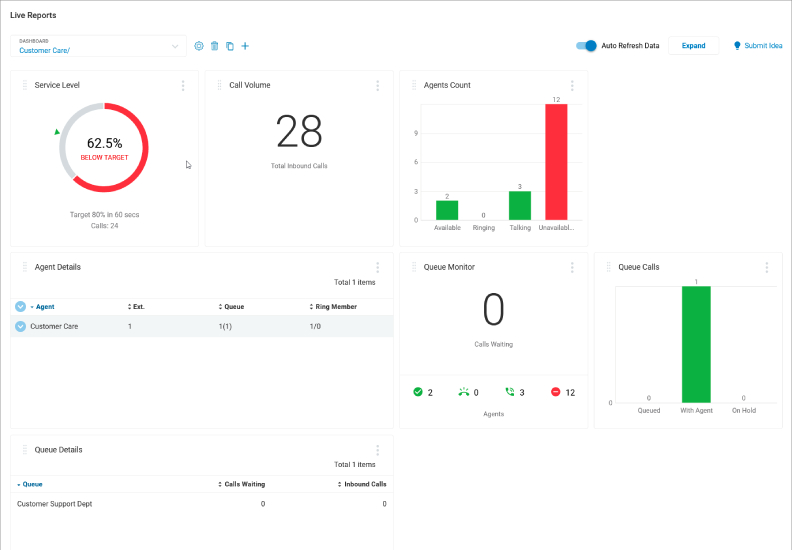
Live reports have configurable live widgets for categorized information. (Source: RingCentral)
- Advanced reporting: Get real-time business-critical information on one screen. Use custom reports to generate actionable insights to improve customer service performance and engagement.
- Team messaging: Send instant updates via one-on-one chats or group threads. This collaboration feature lets users chat, share files, and hop into meetings with one click.
- Video conferencing: Host and participate in virtual meetings and increase engagement with advanced features like screen and file sharing. RingCentral comes with unlimited HD meetings that support up to 200 video participants.
Nextiva: Best for Easy Setup & Coding-free SIP Trunking

What We Liked
- Unmetered plan includes a toll-free number
- Eight U.S. points of presence
- 24/7 support available
Where It Falls Behind
- SIP trunking packages do not include auto-attendants
- Does not offer hardware support
- Video conferencing only available in business VoIP, not SIP trunking
Nextiva Monthly Pricing*
- Metered: $14.95 per user, plus $0.008 per minute for 100 inclusive minutes, fast account setup, and eight U.S. points of presence
- Unmetered: $24.95 per user for one toll-free number, and unlimited calls nationwide
*Volume discounts are available for the Unmetered plan.
Small businesses with little tech know-how looking for a reliable SIP trunking network will find Nextiva straightforward to set up and use. It lets you get more out of your PBX system by offering carrier-grade public switched telephone network (PSTN) connectivity with no coding requirements. Access ready-to-use SIP trunks, which can be deployed within the same day. Depending on your needs, choose from the metered and unmetered pricing plans.
It only takes four simple steps to begin using Nextiva’s SIP trunks. First, get a custom quote, check your hardware compatibility, select or port your number, and lastly, receive your SIP service credentials and start placing calls. You should note that even though Nextiva offers nationwide and international calling, its SIP trunk lacks features like call recording and auto-attendant. If you’re looking for a comprehensive SIP trunk with robust calling features, check out net2phone.
Nextiva Features
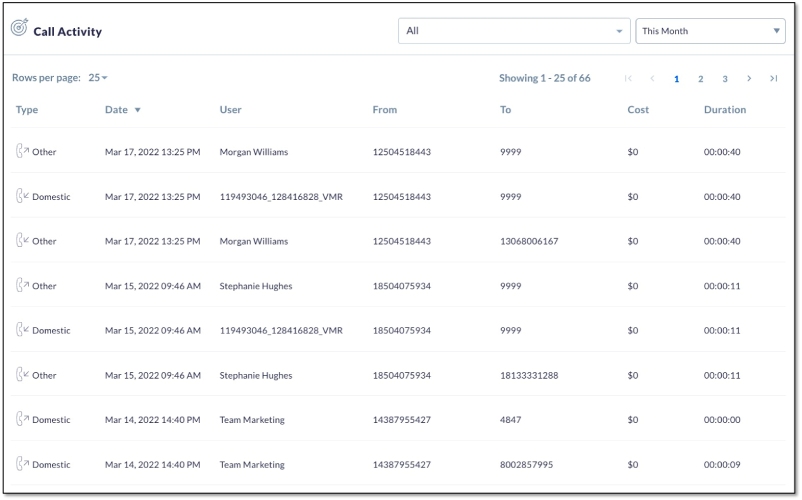
View call history and call activities from the Nextiva admin dashboard. (Source: Nextiva)
- Automatic failover: This automatically switches your PBX system if it fails or goes offline. Nextiva’s cloud connectivity directs calls to another destination.
- Call records: See call details and history reports quickly and securely using the Nextiva admin dashboard.
- Enhanced 911 (E911): Access turnkey E911 functionality that sends an address to emergency services when a call is placed using Nextiva.
Dialpad: Best for Enterprise-grade Security

What We Liked
- Has an app marketplace full of third-party integrations
- Includes artificial intelligence (AI)-assisted coaching
- All plans have multi-level auto-attendant
Where It Falls Behind
- No international SMS in the base plan
- Ring groups are only unlimited in the highest plan
- Google Workspace is the only integration available with the entry-level plan
Dialpad Monthly Pricing*
- Standard: $23 per user for unlimited domestic calling, one local number, business and team messaging, multi-level auto-attendant, and three ring groups
- Pro: $35 per user for international messaging, additional local or international number, quality-of-service reports, phone support, and 25 ring groups
- Enterprise: Custom quote for unlimited ring groups, extensions, and up to 100 seats
*Gain greater savings with annual pre-payments.
Dialpad is an artificial intelligence (AI)-powered business phone system and cloud communication platform with enterprise-grade security features. Privacy and security features include role-based access, encryptions, and a robust admin portal. Single sign-on (SSO) and Health Insurance Portability and Accountability Act (HIPAA) compliance, usually available in enterprise plans, is a feature given to all users. It complies with all major security standards, including SOC2 Type II and ISO.
It is one of the leading VoIP providers thanks to its native AI features like real-time call transcription, voicemail transcriptions, and analytics and reporting. However, Dialpad’s video conferencing features are limited to five hours per meeting for up to 10 participants. For teams needing robust virtual conferencing solutions, give RingCentral a try. Its Pro plan lets you host up to 100 attendees for 24 hours for free.
Dialpad Features
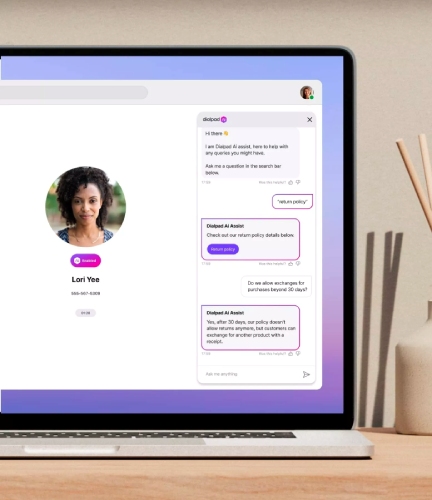
AI technology allows companies to resolve customer concerns without involving a human agent. (Source: Dialpad)
- Instant messaging: Send your team, colleagues, or clients real-time messaging or start a chat using your favorite device.
- Screen sharing: Ensure everyone is on the same page by sharing your screen during an active phone call. Once you’ve activated and used this feature, co-participants will get a link to your screen share.
- Integrations: Build the system that works best for you by integrating the different apps and workflows that your team uses. Dialpad has an App Marketplace consolidating key apps, such as Salesforce, Google Workspace, and Microsoft Teams.
Vonage: Best for Call Quality

What We Liked
- Includes transport layer security (TLS) support, ensuring data privacy
- Programmable SIP
- All plans include 40-plus calling features
Where It Falls Behind
- Business inbox requires extra fees
- Call quality is dependent on broadband speed
- Metered pricing can be costly for high-volume usage
Vonage Pricing*
Making calls:
- Using PSTN Leg: Starts at $0.0134 per minute
- Using SIP Leg: Starts at $0.0042 per minute
Receiving calls:
- Using PSTN Leg: Starts at $0.0048 per minute
- Using SIP Leg: $0.0042 per minute
*Zone-based pricing is also available for the United States. Prices are updated every four hours and fluctuate based on carrier costs and exchange rates.
Vonage makes it easy to connect your PBX system to the cloud with speed and reliability. Power your call and contact center with ALBR, which routes calls to the closest gateway to reduce latency and improve call quality. ALBR determines the user’s location based on the IP address and automatically routes calls to the nearest gateway.
Other features include flexible per-second billing, global inbound and outbound calling, number porting, and custom dashboard analytics. While Vonage’s per-second pricing is affordable, businesses with high-volume calling can quickly rack up communication costs. Businesses looking for generous minute inclusions are better off with Nextiva’s unlimited calling plan. It costs $24.95 per user for one toll-free number and unlimited calls nationwide.
Vonage Features
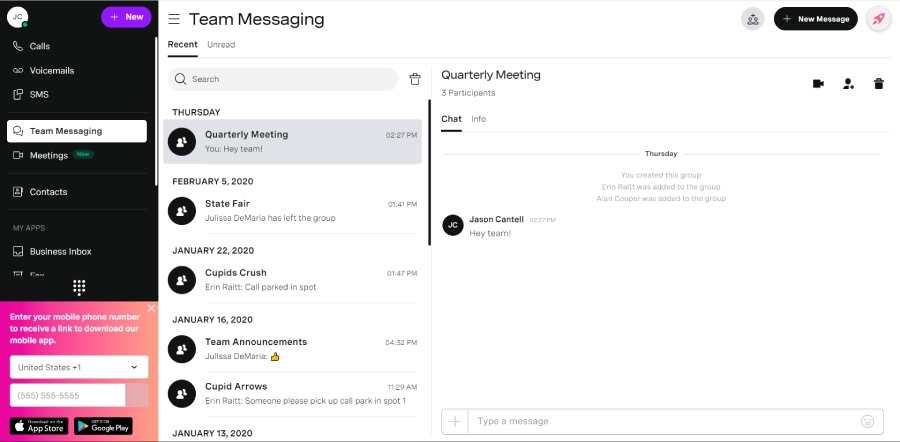
Vonage offers a mobile app available on iPhone and Android. (Source: Vonage)
- Add-on features: Vonage includes several business VoIP phone features but has several tools as add-ons, so you only pay for what you need. Optional features allow small businesses to avoid paying for advanced features they won’t use, such as personalized IT support or phone extensions.
- Call block: Identify phone numbers you don’t want to hear from. Incoming calls from blocked numbers will hear a busy signal, while outgoing callers will be informed that the number they’re trying to call is blocked.
- Vonage boomerang: This feature automatically connects pre-identified callers to your Vonage phone number. Select contacts are connected to your Vonage number, and call charges are applied to your Vonage account.
Twilio: Best for Scalable SIP Systems

What We Liked
- Customer support includes e-guides, phone, email, and online tutorial videos
- Offers budget-friendly, pay-as-you-go pricing
- Comes with built-in conversational AI and chatbots
Where It Falls Behind
- Steep learning curve and requires some coding know-how to maximize
- Limited collaboration features
- Lacks prebuilt integrations
Twilio In-depth Pricing*
Making calls:
- U.S. Zone 1: $0.0053 per minute
- U.S. Toll-free: $0.0010 per minute
Receiving calls:
- Local: $0.0034 per minute, plus $1.15 per month
- Toll-free: $0.0130 per minute, plus $2.15 per month
Monthly Pay-as-you-go Phone Number Pricing
- Local Numbers: $1.15
- Toll-free Numbers: $2.15
*Twilio offers committed-use discounts for which you get lower rates on your important routes, subject to monthly volume.
Twilio’s SIP trunking solution is best for growing businesses handling increasing call traffic and can be scaled up and down as needed. It consolidates your calling network into a single vendor with coverage in 100 countries. Twilio’s pay-as-you-go pricing has no port or channel fees, meaning it does not charge you for channel capacity or concurrent calls. Without channel capacity, businesses can scale and descale on demand.
Twilio Voice Insights generates micro-level analytics for troubleshooting and debugging. While it has many features and self-service tools, Twilio’s SIP trunking has a somewhat complex interface. It requires some programmatic logic and testing, which can be complicated for non-tech-savvy users. Instead, give Nextiva a try. It’s easy to set up and use and requires no coding experience. Best of all, it offers both metered and unmetered plans.
Twilio Features
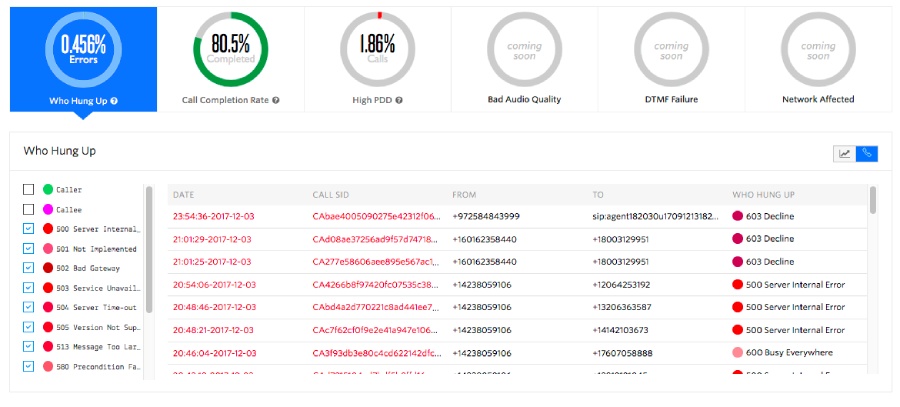
Call logs show call volume, average duration, and other performance metrics. (Source: Twilio)
- Voice insights: Get a complete picture of your call performance. Twilio gives users access to call quality metrics and reporting tools, including finer details like packet loss and jitter.
- Call recording: Users can add secure call recording with public key encryption. Recording controls include start, stop, pause, and resume call recording.
- Omnichannel capabilities: Streamline communications by combining different points of contact into one platform. Twilio supports chat-based channels for your website and both iOS and Android apps.
net2phone: Best for Unlimited Calling

What We Liked
- All plans have access to advanced features like analytics and auto-attendant
- Extensive security and compliance capabilities
- All customers get free premium customer support
Where It Falls Behind
- Toll-free and international numbers are paid add-ons
- Custom API integrations are only available on the highest plan
- Base plan subscribers need to pay for the receptionist console feature
net2phone Monthly Pricing*
- Office: $27.99 per user for unlimited nationwide calling, video conferencing, call recording, and business messaging
- Office Pro: $30.99 per user for receptionist console
- Office Power: $37.99 per user for virtual fax and customer relationship management (CRM) and API integrations
*Annual billing and volume-based discounts are available.
net2phone is best for small businesses looking for an all-in-one communications solution with unlimited calling. This low-cost SIP trunking solution provides unlimited nationwide and international calling to 40-plus countries across all plans. All users can access robust calling features, such as auto-attendant, call recording, video conferencing, and business messaging.
Compared to other VoIP providers with SIP trunking, net2phone offers a pretty generous set of plans, but its toll-free numbers are add-ons. RingCentral is the best option for you if you’re looking for a plan with a free business toll-free number. All RingCentral plans come with free local phone or toll-free numbers. Core plan users get 100 toll-free minutes, and Ultra plan holders get up to 10,000 inclusive minutes monthly.
net2phone Features
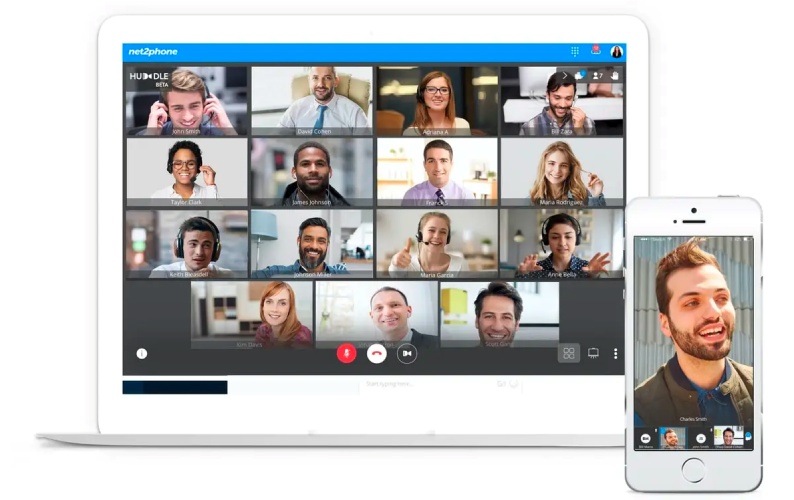
net2phone’s video conferencing tool includes recording, breakout rooms, and screen sharing.
(Source: net2phone)
- Multi-level auto-attendant: Professionally greet each caller and send them to the right team member or department the first time around. Create standard, holiday, and after-hour greetings that will play during the appropriate time.
- Huddle video conferencing: Bring teams together using high-quality virtual conferencing using any device. Huddle is easy to set up and comes with features like video backgrounds, blurring, and screen sharing.
- Free international calling: Enjoy unmetered calling to the U.S., Canada, and over 40 countries. net2phone provides virtual phone numbers in more than 50 countries and 300 cities.
Not what you’re looking for? If you want to migrate to a cloud-based VoIP platform, read our comprehensive guide on how to set up a VoIP system, from planning and budgeting to choosing a provider and installation.
How We Evaluated the Best SIP Trunking Providers
When choosing SIP trunking providers, choose solutions that offer value pricing, multiple communication channels, and comprehensive customer support. To identify the best SIP trunk, we compared the different platforms for small businesses by pricing, features, customer support, and overall ease of use. To develop an expert review, we tested each solution ourselves and considered software feedback from recent users.
Learn how we evaluated the best SIP trunking providers by clicking on the tabs below:
15% of Overall Score
SIP trunk pricing models and packages were a significant consideration because small businesses are concerned with affordability. We gave higher points to VoIP SIP trunk providers with free trials and budget-friendly annual and volume-based discounts.
25% of Overall Score
Great SIP trunking providers offer essential features in their base plan to ensure users have what they need to operate efficiently. General features we prioritized include uptime as well as mobile and desktop app availability. We also considered the platform’s conference calling solutions, and SIP providers with higher uptime SLAs received higher scores.
20% of Overall Score
We examined different SIP trunking service providers and whether they offer niche features like international calling and robust integrations. To enhance productivity, we also looked at the availability of voicemail transcription and toll-free numbers.
10% of Overall Score
Ease of use was determined based on the expertise required to set up and operate the SIP trunk platform. We also assessed if providers have an easy-to-navigate user interface.
10% of Overall Score
Higher customer support points are given to SIP trunking providers with extensive client service options. We assessed which solutions provided the most support, including phone support, email support, live chat, and the hours of operation. Service providers with 24/7 customer support received top marks.
20% of Overall Score
Our expert score is based on our personal experiences using each platform. To balance our findings, we compared our experiences with reviews from other users via reputable review sites. We also considered the overall value for the money, standout features, and general popularity of the services.
Frequently Asked Questions (FAQs)
All you need to set up a SIP trunk is an internet connection, VoIP adapters, and a SIP-compatible PBX system. Before committing to a provider, check your phone system’s compatibility with the solution to ensure you can use your existing equipment seamlessly.
There is no hard and fast rule for bandwidth requirements for SIP trunking, but generally, most experts recommend reserving at least 85Kbps of SIP session bandwidth per call. Multiply this by the number of concurrent calls, and that’s an approximation of your required bandwidth.
One of the biggest challenges to SIP trunking is compatibility between your phone system and your SIP provider. Also, because SIP trunking depends on the network, you can encounter issues such as jitter and latency, resulting in scrambled audio if you don’t have an adequate connection. Address this by ensuring sufficient bandwidth and that your router is configured correctly.
Bottom Line
The best SIP trunking providers revolutionize small business operations by transforming existing PBX equipment into internet-powered phone systems. SIP trunking providers offer solutions that allow you to top robust unified communications (UC) functionality and features, such as call analytics and video conferencing. RingCentral was the best of all SIP trunking providers because of its feature-rich offering, affordable pricing, and phased transition.
Sign up for RingCentral’s free trial to see if this solution can help you improve business flexibility and improve communication costs.